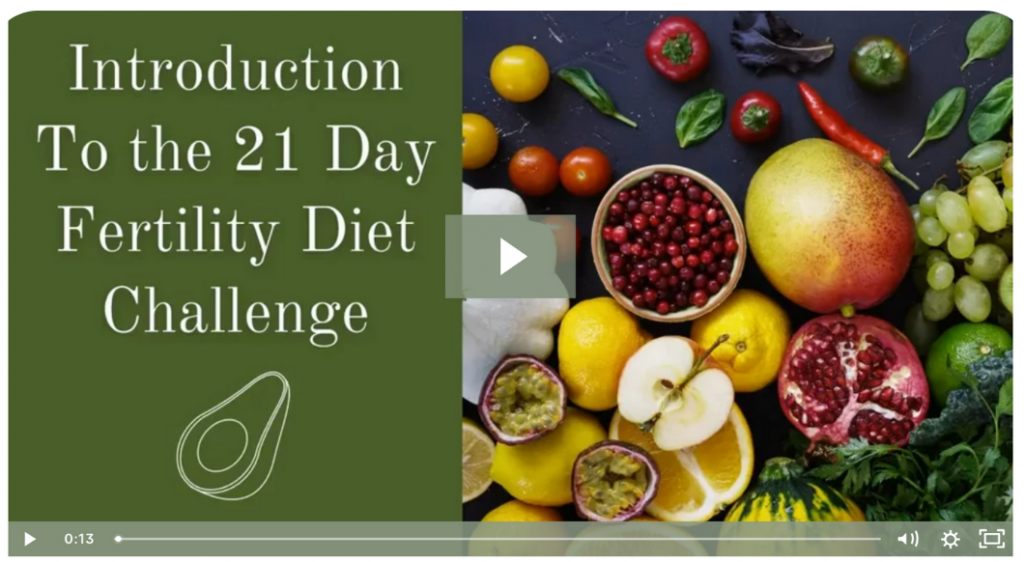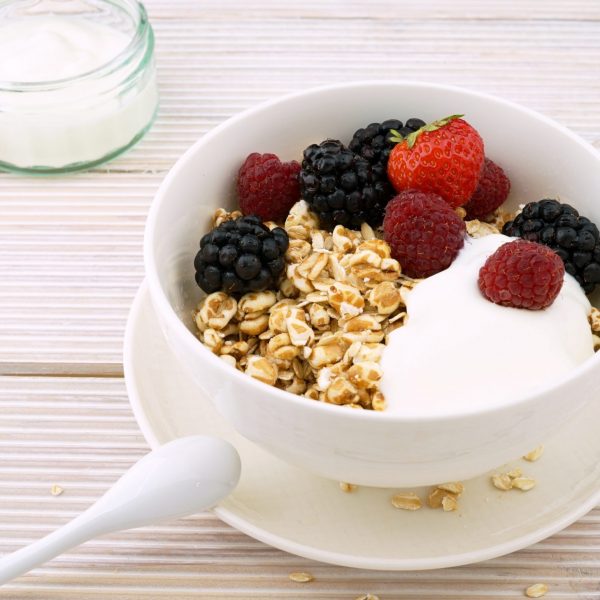The good news: You don’t have to eliminate fats from your diet in order to be healthy and improve your fertility! Essential fats like omega 3’s, 6’s and 9’s are healthy for your reproductive system when consumed as part of a balanced Fertility Diet.
Essential fats help to regulate hormones, increase circulation to the uterus, promote cervical mucus, and balance the menstrual cycle.
However, not all fats are good sources of essential fats. Hydrogenated oils and trans fats are counterproductive to any natural fertility program. Further, some otherwise healthy foods contain rancid fats that you don’t want in your fertility diet either.
“Bad Fats” To Avoid and Why
Hydrogenated Oils
Food manufacturers use the hydrogenation process in order to extend a food’s shelf life (make it shelf stable), prevent rancidity and enhance food texture. The hydrogenation process feeds hydrogen molecules through a polyunsaturated oil to reconstruct its chemical bonds and create stability. The end result is an artificial fat that withstands heat and has a good consistency for baked goods. Here’s one example: hydrogenation converts corn oil to a semi solid margarine. The problem being that fats, especially unsaturated fat, have a tendency to break down and oxidize when exposed to heat and air, rendering them harmful.
Although in the U.S. the FDA has taken steps to ban partially hydrogenated oils, they will be available in foods on grocery store shelves in the U.S. until June 2018. For optimal health and fertility, avoid any foods with hydrogenated oils and partially hydrogenated oils on the ingredient list until the ban takes effect.
Common foods with hydrogenated oils or partially hydrogenated oils in the ingredient list are: soybean oil, palm oil (palm kernel oil), baked goods, fried foods, fast foods, processed snack foods like crackers, desserts, frosting, pastries, shortening, margarine, coffee creamers, and many more.
Trans Fats
Trans fats are byproducts of the hydrogenation process. Although they can withstand heat, they are comparable to animal fats in terms of saturation and negative health effects. The amount of trans fats in foods containing hydrogenated or partially hydrogenated oils varies from food to food. You need to take a close look at food labels to determine the trans-fat content of any processed foods you’re considering purchasing.
Trans fats have numerous negative health effects:
- They can raise bad cholesterol (LDL) and decrease good cholesterol (HDL).
- They are linked to increased cancer risk, skin aging, and decreased immune health.
- Trans fats may also increase risk for diabetes, heart disease, and stroke. Research from the American Journal of Public Health finds trans fats may be linked to 30,000 heart disease deaths every year!
- Trans fats also affect your ability to metabolize essentials fats, which are critical for health and fertility.
Trans fats and your fertility…
Research from the Harvard School of Public Health shows that the more trans fats a woman eats, the higher her risk for fertility problems. Eating trans fats triggers inflammation, and affects insulin sensitivity and glucose metabolism, common issues in women who are overweight or those with PCOS. Women with PCOS should take great care to avoid trans fats so as to not worsen their symptoms.
2007 Research from the American Journal of Clinical Nutrition reveals trans fats may also disrupt ovulation. Women who eat more trans fats compared to monounsaturated or polyunsaturated fats have double the risk of ovulatory infertility. Trans fats have also been linked to decreased sperm count in animal tests and preliminary human research.
Plant-based essential fats offer more fertility benefits: avocado, coconut or olive oil, chia/flax/hemp/sunflower seeds, dark greens and seaweed.
Interested in learning more? Our guide Trans Fats May Increase Infertility Issues would be worth reading.
Rancid Fats
What about rancid fats? Are raw nuts as healthy as you think? As much as I love raw nuts and nut butters as sources of essential fats and protein, their oils are highly susceptible to rancidity.
Oxidized, rancid fat is very hard to digest and creates liver stress, especially for people with weak digestive systems. Consuming rancid fats can also increase free-radical production, and potentially damage egg and sperm health.
It’s important to make sure your raw nuts and nut butter are very fresh when working on your fertility. Be very selective and try to opt for nuts only grown in your state or very close to you when they’re in season. Seeds can be a better choice as they are more resistant to oxidation.
The best states for nuts: California (Almonds, Walnuts (except during droughts)), Oregon (Hazelnuts), Georgia, Texas, New Mexico, Oklahoma, Arizona, South Carolina (Peanuts, Pecans), New Mexico, Nevada, Colorado (Pine Nuts) and Hawaii (Pecans, Macadamia nuts).
Watch The Introduction to the 21 Day Fertility Diet Challenge
- Learn how to transition to a natural fertility diet by focusing on the important 5
- Get all the details on how to use nutrition as a tool for hormonal health, cell protection and fertility wellness
- An effective tool to help your tastebuds transition towards healthier foods
- Learn which foods are most important for fertility and how to regularly eat them

The Bottom Line on Bad Fats and Your Fertility
The best way to avoid artificial fats like hydrogenated oils, partially hydrogenated oils, and trans fats is by shopping the parameters, outer aisles, of the grocery store. Always choose whole, unprocessed foods rather than eating fast food or foods out of a box, especially when working on a fertility concern.
Limit saturated fats from non-organic animal foods. Choose whole, fresh plant sources of monounsaturated or polyunsaturated fats instead.
Nuts and seeds are good sources of essential fats and protein, but make sure they are fresh and stored properly (refrigerate or freeze them). Healthy oils in nuts like walnuts or almonds go rancid during long shipment times from state to state. Seeds have a higher resistance to rancidity, and may be a better choice if you live in a state without access to fresh nuts.
Eating a Fertility Diet with fresh fruits and vegetables, high-quality organic protein sources, whole grains, and essential fats enhances nutrition and fertility, while decreasing exposure to artificial fats and foods that can harm your health and reproductive system.
- Page, L. & Abernathy, S.(2011). Healthy Healing 14th Edition. Healthy Healing Pub.
- Fooducate (2010, Oct.). Partially vs. Fully Hydrogenated Oils. Retrieved from: http://www.fooducate.com/app#!page=post&id=57A33225-7882-F994-4D15-92306378627F
- Resnik, D. (2010). Trans Fat Bans and Human Freedom. The American Journal of Bioethics, 10(3), 27-32. doi:10.1080/15265160903585636. Retrieved from: https://www.ncbi.nlm.nih.gov/pmc/articles/PMC3941190/
- The Nutrition Source: Types of Fats (2016). Harvard T.H. Chan School of Public Health. Retrieved from: https://www.hsph.harvard.edu/nutritionsource/types-of-fat/
- Barton-Schuster, D.(n.d.). Good News For Fertility: FDA Bans Trans Fats from Food in the US. Retrieved from: http://natural-fertility-info.com/fda-bans-trans-fats.html
- Breyer, M.(2015, April). 5 Nuts Not Grown in California. Retrieved from: http://www.treehugger.com/green-food/5-nuts-not-primarily-grown-california.html





